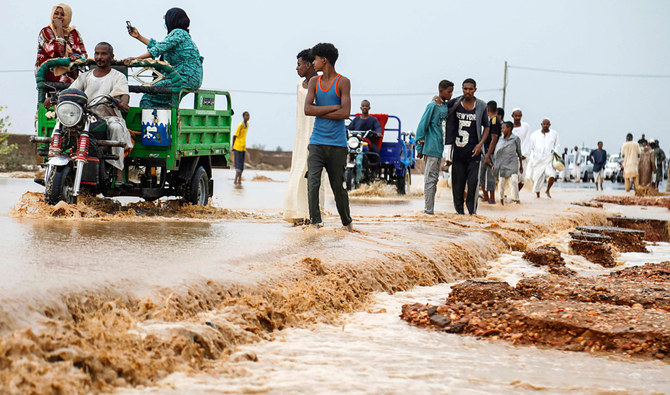WAD MADANI, Sudan: Torrential rain has destroyed more than 450 homes in Sudan’s north, state media reported Monday, validating concerns voiced by aid groups that the wet season would compound the war-torn country’s woes.
Changing weather patterns saw Sudan’s Northern State buffeted with heavy rain, causing damage to at least 464 houses, state-run SUNA news agency said. It described the vast region bordering Egypt and Libya as “a desert area that rarely received rain in the past, but has been witnessing devastating rains for the past five years.”
The tragedy comes nearly four months into a brutal war between the army and the paramilitary Rapid Support Forces that has decimated infrastructure and plunged millions into hunger.
Medics and aid groups have for months warned that Sudan’s rainy season, which began in June, could spell disaster for millions more — increasing the risk of malnutrition, vector-borne diseases and displacement across the country.
According to the World Health Organization, outbreaks of cholera and measles have already been reported in parts of the country that have been nearly impossible for relief missions to access.
More than 80 percent of Sudan’s hospitals are no longer in service, the WHO said, while the few health facilities that remain often come under fire and struggle to provide care.
The conflict, which erupted in the capital Khartoum on April 15, has displaced more than three million people internally with many in urgent need of aid, according to the International Organization for Migration.
Nearly a million others have fled across borders seeking safety, it said.
Aid groups repeatedly complain of security challenges, bureaucratic hurdles and targeted attacks that prevent them from delivering much-needed assistance.
Again on Monday, Khartoum’s densely populated neighborhoods were pummeled by rockets and heavy artillery fire, witnesses said.
The fighting between army chief Abdel Fattah Al-Burhan and his former deputy, RSF commander Mohamed Hamdan Dagalo, has killed more than 3,900 people, according to a conservative estimate by the Armed Conflict Location and Event Data Project.

























